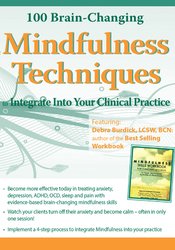

Enhance your treatment plans for anxiety, depression, ADHD, OCD, bipolar disorder, sleep, pain, and stress with brain-changing mindfulness skills tailored to the problems your clients face each day.
Watch this workshop and get detailed guidance on the hows, whys, and whens of incorporating core and advanced mindfulness skills into your clinical practice. Build your client education skills and improve therapeutic engagement with clear explanations regarding the neurobiology behind mindfulness. Interactive demonstrations and step-by-step instruction on specific interventions and exercises will give you the tools you need to treat a variety of disorders and populations. And the opportunity to practice under the direction of our instructor will boost your confidence in using your new skills. Better still, you’ll walk away with a four-step process that ties it all together, making what you’ve learned immediately relevant to your own work with clients.
| File type | File name | Number of pages | |
|---|---|---|---|
| Manual (2.02 MB) | 147 Pages | Available after Purchase |
Debra Burdick, LCSW, BCN, also known as ‘The Brain Lady’, is a Licensed Clinical Social Worker and a board certified neurofeedback practitioner. Debra is an international speaker and author of the best-selling books Mindfulness Skills Workbook for Clinicians and Clients: 111 Tools, Techniques, Activities & Worksheets (PESI, 2013), Mindfulness Skills for Kids & Teens: A Workbook for Clinicians & Clients with 154 Tools, Techniques, Activities and Worksheets (PESI, 2014), ADHD: Non-Medication Treatments and Skills for Children and Teens (PESI, 2015) and Mindfulness Skills for Kids: Card Deck and 3 Card Games (PESI, 2017). She has taught mindfulness skills to her clients for over 25 years.
She recently retired from her private practice, and previously worked at the Child Guidance Clinic, Family Services, Child and Family Agency, and Lawrence and Memorial Hospital.
Debra incorporates mindfulness skills in all areas of her practice. She initially became interested in mindfulness to deal with a chronic illness (now thankfully healed). She found it so helpful in her own life that she started teaching her clients the skills she was using. She went on to develop clinical material on mindfulness skills and created a four-step process for working with clients using mindfulness that she perfected in her private practice and in an intensive outpatient program. Her clients have shown her that mindfulness skills improve the rate and quality of treatment outcomes.
Debra has presented numerous presentations, workshops, and teleseminars. She is often interviewed on Internet radio and telesummits and her work has been featured in The Day newspaper, Self-Improvement Magazine, and “Parenting Powers” television show.
Speaker Disclosures:
Financial: Debra Burdick maintains a private practice. She is an author for Vervante publishers and receives royalties. She receives a speaking honorarium from PESI, Inc. She has no relevant financial relationships with ineligible organizations.
Non-financial: Debra Burdick contributes to SelfGrowth.com and receives no compensation.
From Mindfulness
Clinical Application of Mindfulness Strategies to Specific Disorders
How to Integrate Mindfulness into Clinical Practice
Please wait ...